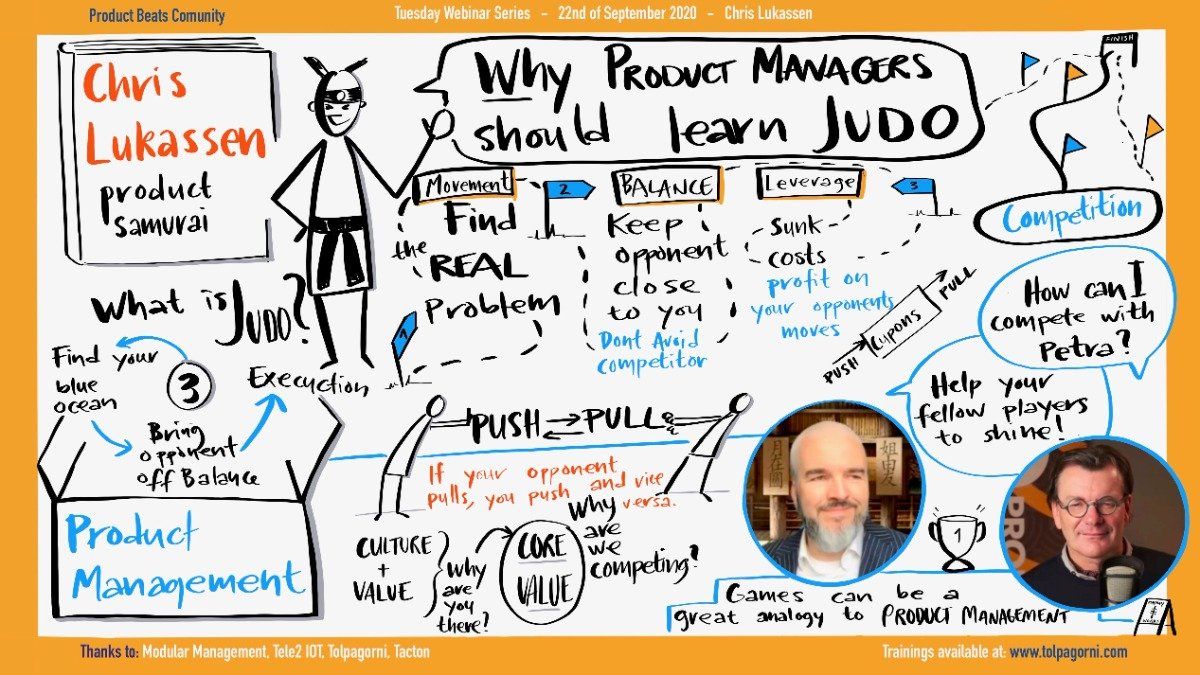Episode 26: Why Product Managers Should Learn Judo w/Chris Lukassen
22 Seprember, 2020 / Host: Magnus Billgren
Why Product Managers Should Learn Judo
Product management is an art that requires careful attention to detail, strategy, and tactics. It is a role that requires a diverse skill set, including leadership, communication, problem-solving, and analytical thinking. Many theories guide us on how to approach competition. Some suggest going where there is no competition, while others recommend identifying your enemy and beating them. Huawei managers are even advised to read "The Art of War" to learn various strategies on how to beat competitors. However, modern agile thinkers suggest focusing on our product, not the competitor.
Chris Lukassen, a former product manager turned Agile coach and trainer, shared insights on how the principles of Judo can be applied to product management. Lukassen provides a new perspective on how to work with competitors from a Martial Arts perspective. He shared the three principles of Judo as a way to compete:
- Tsukiri - Focus on your movement and get in position to compete.
- Kazushi - Make your competitor lose her balance
- Kake – Use the activities by your competitor and leverage them into your advantage.
Tsukiri: Finding Uncontested Space
The first principle of Judo that product managers can apply is "Tsukirit," which means finding uncontested space. According to Lukassen, the principle of finding space is about avoiding attacking your competition directly. Instead, it is about finding a space where you have an advantage.
To illustrate this, Lukassen shared his experience working with a large DIY store in the Netherlands. He explained that the store's biggest competitor was not another DIY store, but Amazon.
To compete with Amazon, Lukassen and his team went back to the real problem - why do people go to a DIY store and buy stuff? They discovered that people go to DIY stores to fix problems, and DIY stores have experts who can help them fix those problems. Lukassen's team then created a chatbot that connected customers to experts in the store who could help them fix their problems. This strategy was difficult to copy and gave the DIY store an advantage in the market.
Kazushi: Breaking the Balance
The second principle of Judo that product managers can apply is "kazushi," which means breaking the balance. In Judo, breaking the balance means bringing your opponent off-balance. Once your opponent is off-balance, they become weightless, and you can lift up to three times your own weight without breaking a sweat. Lukassen believes that breaking the balance is crucial in product management. He said that as a product manager, it is essential to keep your competitors close to you and avoid being distracted by what they are doing. Lukassen explained that breaking the balance means keeping your focus on the user and the problem you are solving for them. By doing so, you are more likely to create a product that is valuable to your users.
Kake: The Execution of the Throw
The third principle of Judo that product managers can apply is "kake," which means the execution of the throw. In Judo, the execution of the throw happens when your opponent is off-balance, and gravity and movement work against them. In product management, the execution of the throw is when you deliver your product to your users. According to Lukassen, delivering a product is not just about shipping features; it is about delivering value to your users. Lukassen advised product managers to focus on delivering value incrementally and iteratively. By doing so, product managers can ensure that their product meets their users' needs and is valuable to them.
Takeaways
- Judo principles can be applied to product management - The principles of judo, including finding uncontested space, creating unbalancing movements, and executing techniques with minimal effort, can be adapted and applied to product management. By finding unique opportunities, disrupting competitors' balance, and executing strategies with precision, product managers can gain a competitive advantage in their market.
- Focusing on solving problems rather than selling products - Instead of focusing solely on selling products, product managers should focus on solving problems for their customers. By understanding their customers' needs and pain points, and creating solutions that address those issues, product managers can build a loyal customer base and differentiate themselves from competitors.
- Importance of human expertise in the age of AI - While AI and technology can be useful tools for product management, there is still a need for human expertise and experience. By leveraging the knowledge and skills of experienced employees, companies can provide unique and personalized solutions to their customers that cannot be replicated by AI.
Speaking of mastering the principles of product management, there's no better way to do it than by enrolling in a comprehensive program like The Productbeats Product Management Certification Program. This program is designed to equip aspiring and experienced product managers with the knowledge, skills, and practical experience needed to excel in their roles. Through this program, you'll learn how to navigate the complexities of the product management landscape, from ideation and customer research to product design, development, and launch. You'll also gain a deeper understanding of the key principles that underpin effective product management, including market analysis, product strategy, roadmap planning, and stakeholder management.Whether you're just starting out in your product management career or looking to take your skills to the next level, The Productbeats Product Management Certification Program is an excellent investment in your professional development. With a combination of hands-on training, expert guidance, and real-world experience, you'll be well-positioned to take your product management career to new heights.
You might also enjoy watching...
Copyright © 2026 ProductBeats AB

Get The Program Brochure
Submit the form below to have The Program Brochure delivered to your inbox
The title of the notification
The descriptive text of the notification


